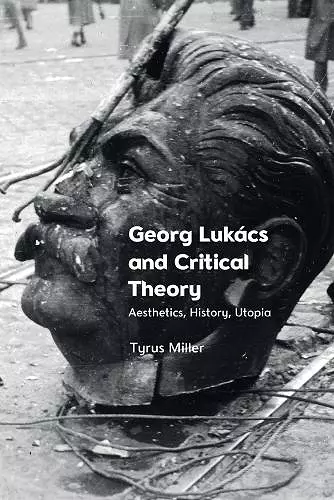Georg Lukács and Critical Theory
Aesthetics, History, Utopia
Format:Hardback
Publisher:Edinburgh University Press
Published:26th Oct '22
Currently unavailable, and unfortunately no date known when it will be back

This book examines the heritage of critical theory from the Hungarian Marxist philosopher Georg Lukács through the early Frankfurt School up to current issues of authoritarian politics and democratisation. Interweaving discussion of art and literature, utopian thought, and the dialectics of high art and mass culture, it offers unique perspectives on an interconnected group of left-wing intellectuals who sought to understand and resist their society's systemic impoverishment of thought and experience. Starting from Lukács’s reflections on art, utopia, and historical action, it progresses to the Frankfurt School philosopher Theodor W. Adorno’s analyses of music, media, avant-garde and kitsch. It concludes with discussions of erotic utopia, authoritarianism, postsocialism, and organised deceit in show trials – topics in which the legacy of Lukács and Frankfurt School critical theory continues to be relevant today.
[Miller] comes neither to bury Lukács nor to praise him, but to broaden and enrich our view of his oeuvre. As he concludes: ‘No ultimate verdict has been pronounced either about Lukács himself or about the position he might hold for a future critical theory that for many decades has mostly sought to monumentalize him or keep him discreetly out of sight’ (p. 261). The intellectual historian Martin Jay, in his blurb for the back of the book, calls the work a collection of ‘sprightly essays’, and that is certainly a good way to approach a series of arguments that, at their best, are erudite, informative, surprising, and well-written. -- Benjamin Morgan, Worcester College * Oxford German Studies *
For those who have concluded that Lukács has nothing more to teach us or feel exhausted by the surfeit of commentaries on Adorno, Tyrus Miller’s sprightly essays on their entangled legacy will come as a refreshing surprise. He knows how to pose suggestive questions and come up with provocative answers, which demonstrate the continuing relevance of Western Marxism in the twenty-first century. -- Martin Jay, University of California, Berkeley
This volume by Miller makes an important contribution to readers' understanding of Georg Lukács, the Frankfurt School, and late modern culture. [...] A major highlight is Miller’s juxtaposition of the Frankfurt School’s approach to interdisciplinary research with post–Cold War efforts by artists and humanists in Hungary to come to terms with experiences under communism. Summing Up: Recommended. -- Thomas Wheatland, Assumption University * CHOICE *
ISBN: 9781399502412
Dimensions: unknown
Weight: unknown
280 pages